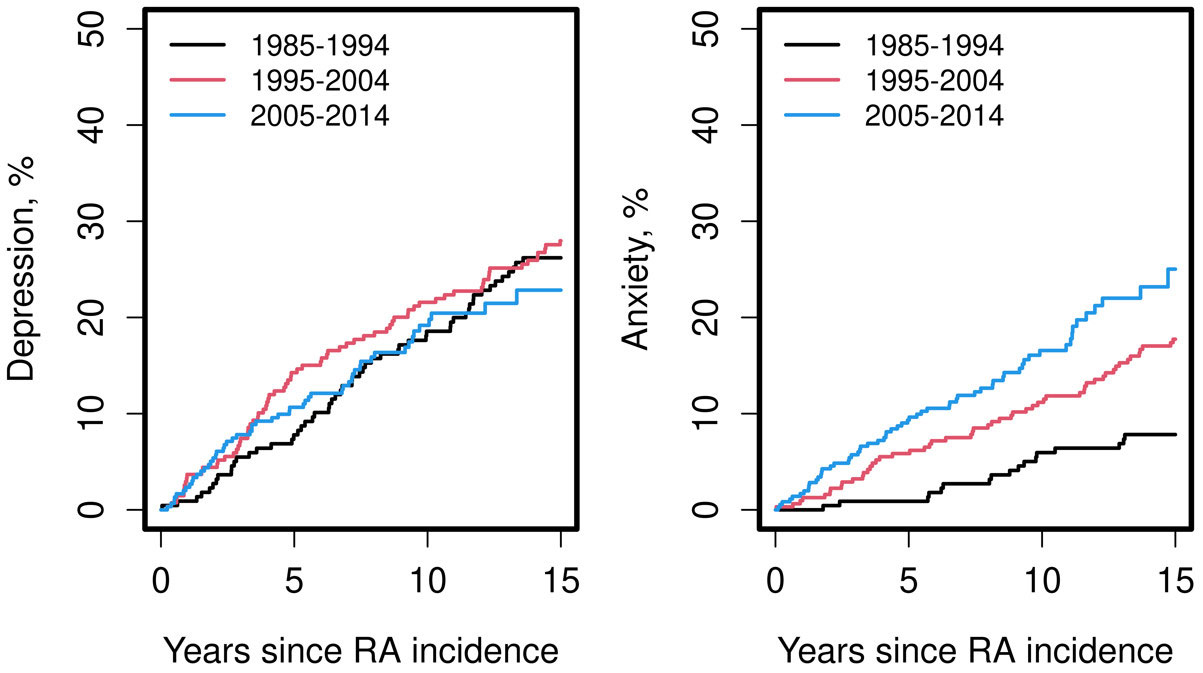Session Information
Session Type: Poster Session B
Session Time: 9:00AM-10:30AM
Background/Purpose: Depression and anxiety are known to occur more commonly in patients with RA. For example, recent studies estimate a depression point-prevalence of 17% in patients with RA, compared to 5% in the general population. Newer treatments for RA have led to better outcomes, but it is unknown whether improved control of RA disease activity has also decreased depression and anxiety in patients with RA. We aimed to investigate trends in depression/anxiety incidence over 3 decades in a population-based cohort of patients with RA.
Methods: We identified incident RA cases (age >18 years, met 1987 ACR criteria in 1985-2014) in a geographically defined area. Patients were followed until death, migration or 12/31/2020. Depression and anxiety were defined using established ICD9/10 code sets and requiring at least 2 diagnosis codes 30 days apart. Patients with depression or anxiety prior to RA incidence date were excluded. Cox proportional hazards models compared trends in incidence of depression and anxiety by decade, adjusting for age and sex. Cumulative incidence of depression and anxiety adjusted for competing risk of death was calculated.
Results: The study included 1012 patients with RA (mean age 55.9 years; 68% female). There were 240, 343, and 429 cases in 1985-1994, 1995-2004 and 2005-2014, respectively. Depression and anxiety present at RA incidence both increased significantly (p< 0.001) over the 3 time periods (8%, 21%, 30% for depression and 5%, 8%, 17% for anxiety, respectively). During median follow-up of 10.6, 10.4 and 10.2 years per decade, depression developed in 80, 84, and 54 patients and anxiety developed in 37, 66, and 61 patients. There was no change in cumulative incidence of depression over time, but patients with incident RA in 2005–14 had markedly higher cumulative incidence of anxiety than patients diagnosed in earlier decades (Figure). Hazard ratios (HR) demonstrated a temporal increase in anxiety among patients with incident RA in 2005-2014 (HR: 2.98; 95% confidence interval (CI): 1.87-4.75) and patients with incident RA in 1995-2004 (HR: 1.77; 95% CI: 1.15-2.71) compared with incident RA in 1985-1994. Results did not change after additional adjustment for smoking status and obesity or highest ESR in the first year of RA. These trends were most pronounced in RF/CCP positive patients (data not shown).
Conclusion: In incident RA patients, the occurrence of depression did not improve over time while the occurrence of anxiety increased substantially over time, particularly in RF/CCP positive patients. These findings may indicate increased awareness and diagnosis of anxiety. Nevertheless, the lack of improvement in depression and anxiety, despite advances in RA treatment, warrants further attention.
To cite this abstract in AMA style:
Giblon R, Achenbach S, Myasoedova E, Davis J, Kronzer V, Crowson C. Incidence of Depression and Anxiety in Rheumatoid Arthritis Patients over Three Decades: A Population-Based Study [abstract]. Arthritis Rheumatol. 2022; 74 (suppl 9). https://acrabstracts.org/abstract/incidence-of-depression-and-anxiety-in-rheumatoid-arthritis-patients-over-three-decades-a-population-based-study/. Accessed .« Back to ACR Convergence 2022
ACR Meeting Abstracts - https://acrabstracts.org/abstract/incidence-of-depression-and-anxiety-in-rheumatoid-arthritis-patients-over-three-decades-a-population-based-study/

